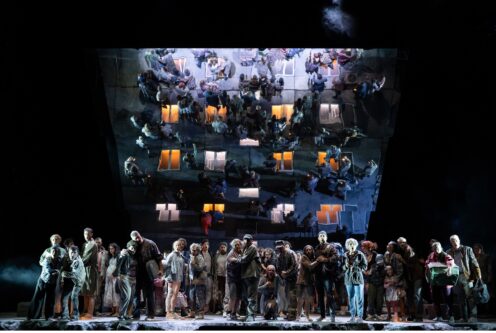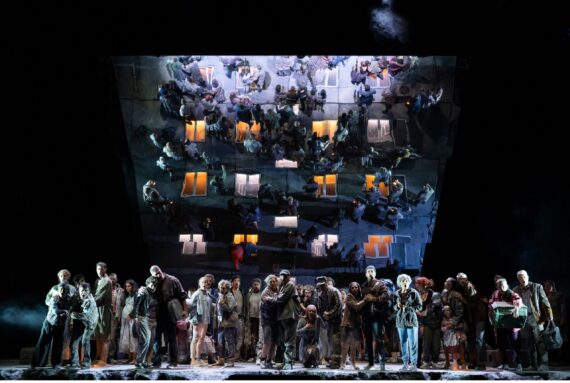 Germany Verdi, Nabucco: Soloists, Chorus and Extras of Deutsche Oper am Rhein / Katharina Müllner (conductor). Deutsche Oper am Rhein, Düsseldorf, 29.9.2024. (DMD)
Germany Verdi, Nabucco: Soloists, Chorus and Extras of Deutsche Oper am Rhein / Katharina Müllner (conductor). Deutsche Oper am Rhein, Düsseldorf, 29.9.2024. (DMD)

Production
Director – Illaria Lanzino
Set design – Dorota Caro Karolczak
Costume design – Carola Volles
Lighting design – Thomas Diek
Video – Andreas Etter, Fabio Stoll
Dramaturgy – Heili Schwarz-Schütte
Chorus director – Patrick Francis Chestnut
Cast:
Abigaille – Svetlana Kasyan
Fenena – Kimberley Boettger-Soller
Ismaele – Jussi Myllys
Nabucco – Alexey Zelenkov
Zaccaria – Liang Li
High Priest of Baal – Beniamin Pop
Abdalla – Florian Simson
Anna – Elisabeth Freyhoff
For the duration of the overture, a large screen just behind the curtain showed video footage, created by Andreas Etter and Fabio Stoll, of a contemporary cityscape of moderately high-rise blocks of flats. Behind the façade of one of those blocks, we saw through the windows, glimpsing people going about their daily lives. A pregnant woman, two children practising their musical instruments, a man cooking, a couple at dinner, some people having an argument. The colours were warm. The screen was raised, the floor of the stage was created by the front of such a block of flats, members of the chorus emerged from the windows, a set of huge mirrors above the stage reflected the floor.
This impressive set was designed by Dorota Caro Karolczak. We had now entered the times of war. The lighting, designed by Thomas Diek, was harsh, people from both sides of the war were dressed in the same manner (elaborate costume design by Carola Volles), looked similar, the different sides could be made out only from the different attire of their respective soldiers. A lot of detail went into the staging of those crowd scenes, many individual stories were told, including a sudden birth. The atmosphere of that crowd was reminiscent of a good production of the musical Les Misérables. For the plot, director Illaria Lanzino and dramaturg Heili Schwarz-Schütte had created a convincing story. Those in power, the ruling and war-driven characters – the roles for the soloists in Verdi’s opera – retained their glamorous costumes, they resided in ivory and golden environments (above and below the level of the street) complete with the overlong table notorious from Putin’s Kremlin. The past of the Nabucco household was brought to the fore through the use of child performers as young Abigaille (headstrong, moody and cruel), young Fenena (initially genuinely innocent, later learning to gain her advantages from playing innocent) and young Ismaele (always preferring Fenena over Abigaille and being made to suffer for it early on).
In due course, on the war-torn streets, a barricade of household items demarcated the border between enemies, soldiers were facing each other with increasing proximity, the bayonets on their rifles almost literally in each other’s faces. Initially eager, the soldiers were restrained by the people from attacking each other, and in the end, the soldiers realised how ridiculous their enmity was. They gave up, literally laying down their weapons, and the members of the public embraced each other. They now vented their pent-up rage on those in power who had brought all the misery on them with their own sad little ego games. In the end, the members of the ruling class from both sides were seen burning at the stake.

Patrick Francis Chestnut led his chorus very well through the many highs and lows of the story, overwhelming by the sheer volume of their singing. Katharina Müllner brought a thrilling combination of enthusiastic youthfulness and incredibly detailed preparation to her reading of the score. Throughout, she clearly lived and breathed with the events and artists on the stage, allowing for expansiveness and depth just as much as for accelerated speed and poignant rhythm as needed. Alexey Zelenkov was a superb Nabucco. His voice was appropriately able to soar with and above the orchestra, while he made the subtler material into very moving moments. Liang Li’s sonorous bass allowed for Zaccaria to combine convincingly the functions of religious leader and military chief given to him by the production. Jussi Myllys, Beniamin Pop, Florian Simson and Elisabeth Freyhoff made the most of their small parts of Ismaele, High Priest, Abdalla, and Anna, respectively.
Svetlana Kasyan (Abigaille) has made a name for herself in the Italian repertory (Tosca, Aida, Nabucco, Madama Butterfly, Il trovatore) in medium-sized opera houses in her native Russia and across the world. Her voice was powerful and well-rounded across the registers, easily able to cut through the full orchestra. Intonation was precise, and she took on the intricate rhythms and coloratura of the role without fear. Kimberley Boettger-Soller settled quickly into her role as Fenena, making you wish for more.
Daniel Meyer-Dinkgräfe
